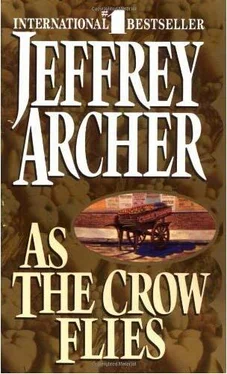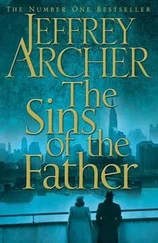The same evening, despite being surrounded by the enemy, he rescued two men of his own company, Private T. Prescott and Corporal C. Trumper, who had strayed from the battlefield, and were hiding in a nearby church. After nightfall, he led them back across green terrain while the enemy continued to fire intermittently in their direction.
Private Prescott was killed by a stray German tracer bullet before he managed to reach the safety of his own trenches. Corporal Trumper survived despite a continual barrage of fire power from the enemy.
For this singular act of leadership and heroism in the face of the enemy, Captain Trentham was awarded the M.C.
Having written out every word of the citation in my neatest hand, I closed the heavy cover and turned the book back round to face the sergeant.
"Trentham," he said. "If I remember correctly, miss, 'e still 'as 'is picture up on the wall." The sergeant picked up some crutches, maneuvered himself from behind the counter and limped slowly to the far corner of the museum. I hadn't realized until that moment that the poor man only had one leg. "Over 'ere, miss," he said. "Follow me."
My palms began to sweat and I felt a little sick at the thought of discovering what my father looked like. I wondered if I might resemble him in any way.
The sergeant hobbled straight past the VCs before we came to a row of MCs. They were all lined up, old sepia pictures, badly framed. His finger ran along them—Stevens, Thomas, Tubbs. "That's strange. I could have sworn 'is photo was there. Well, I'll be damned. Must 'ave got lost when we moved from the Tower."
"Could his picture be anywhere else?"
"Not to my knowledge, miss," he said. "I must 'ave imagined it all along, but I'd swear I'd seen 'is photo when the museum was at the Tower. Well, I'll be damned," he repeated.
I asked him if he could supply me with any more details of Captain Trentham and what might have happened to him since 1918. He hobbled back to the counter and looked up his name in the regimental handbook. "Commissioned 1915, promoted to first lieutenant 1916, captain 1917, India 1920–1922, resigned 'is commission August 1922. Since then nothing known of 'im, miss."
"So he could still be alive?"
"Certainly could, miss. He'd only be fifty, fifty-five, most."
I checked my watch, thanked him and ran quickly out of the building, suddenly aware of how much time I had spent at the museum and fearful that I might miss the train back to London and wouldn't be in time to clock on for my five o'clock shift.
After I had settled in a corner of a dingy third-class compartment I read over the citation again. It pleased me to think that my father had been a First World War hero; but I still couldn't fathom out why Miss Benson had been so unwilling to tell me anything about him. Why had he gone to Australia? Had he changed his name to Ross? I felt I would have to return to Melbourne if I was ever going to find out exactly what had happened to Guy Francis Trentham. Had I possessed the money to pay for my return fare, I would have gone back that night, but as I had to work out my contract at the hotel for another nine months before they would advance me enough cash to cover the one-way ticket home I settled down to complete my sentence.
London in 1947 was an exciting city for a twenty-three-year-old so despite the dreary work there were many compensations. Whenever I had any time off I would visit an art gallery, a museum or go to a cinema with one of the girls from the hotel. On a couple of occasions I even accompanied a group of friends to a dance at the Mecca ballroom just off the Strand. One particular night I remember a rather good-looking bloke from the RAF asked me for a dance and, just moments after we had started going round the hall, he tried to kiss me. When I pushed him away he became even more determined and only a firm kick on his ankle followed by a short dash across the dance floor made it possible for me to escape. A few minutes later I found myself out on the pavement and heading back to the hotel on my own.
As I strolled through Chelsea in the general direction of Earl's Court I stopped from time to time to admire the unattainable goods on display in every shop window. I particularly craved a long blue silk shawl draped over the shoulders of an elegant slim mannequin. I stopped window-shopping for a moment and glanced up at the name over the door: "Trumper's." There was something familiar about the name but I couldn't think what. I walked slowly back to the hotel but the only Trumper I could recall was the legendary Australian cricketer who had died before I was born. Then in the middle of the night it came back to me. Trumper, C. was the corporal mentioned in the citation written about my father. I jumped out of bed, opened the bottom drawer of my little desk and checked the words I had copied out during my visit to the Royal Fusiliers Museum.
The name was not one I'd come across since arriving in England, so I wondered if the shopkeeper might be related in some way to the corporal and therefore might help me find him. I decided to return to the museum in Hounslow on my next day off and see if my one-legged friend could be of any further assistance.
"Nice to see you again, miss," he said as I walked up to the counter. I was touched that he remembered me.
"More information you're after?"
"You're right," I told him. "Corporal Trumper, he's not the . . . ?"
"Charlie Trumper, the 'onest trader. Certainly is, miss; but now 'e's Sir Charles and owns that large group of shops in Chelsea Terrace."
"I thought so."
"I was about to tell you all about 'im when you ran off last time, miss." He grinned. "Could 'ave saved you a train journey and about six months of your time."
The following evening, instead of going to see Greta Garbo at the Gate Cinema in Notting Hill, I sat on an old bench on the far side of Chelsea Terrace and just stared at a row of windows. Sir Charles seemed to own almost every shop on the street. I could only wonder why he had allowed such a large empty space to remain right in the middle of the block.
My next problem was how I could possibly get to see him. The only idea that occurred to me was that I might take my medal into Number 1 for a valuation and then pray.
During the next week I was on the day shift at the hotel so I was unable to return to Number 1 Chelsea Terrace before the following Monday afternoon, when I presented the girl on the front counter with my MC and asked if the medal could be valued. She considered my tiny offering, then called for someone else to examine it more carefully. A tall, studious-looking man spent some time checking the piece before he offered an opinion. "A miniature MC," he declared, "sometimes known as a dress MC because it would be worn on a mess or dinner jacket for regimental nights, value approximately ten pounds." He hesitated for a moment. "But of course Spinks at 5 King Street SW1 would be able to give you a more accurate assessment should you require it."
"Thank you," I said, having learned nothing new and finding myself quite unable to think of any way I might phrase a question about Sir Charles Trumper's war record.
"Anything else I can help you with?" he asked as I remained rooted to the spot.
"How do you get a job here?" I bleated out, feeling rather stupid.
"Just write in, giving us all the details of your qualifications and past experience and we'll be back in touch with you within a few days."
"Thank you," I said and left without another word.
I sat down that evening and drafted a long handwritten letter, seeing out my qualifications as an art historian. They appeared a bit slender to me when I looked at them on paper.
The next morning I rewrote the letter on the hotel's finest stationery before addressing the envelope to "Job Inquiries" as I had no name as a contact other than Trumper's Number 1 Chelsea Terrace, London SW7.
Читать дальше












